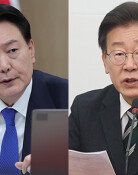Abe draws N. Korea sanctions into export controls against S. Korea
Abe draws N. Korea sanctions into export controls against S. Korea
Posted July. 08, 2019 07:41,
Updated July. 08, 2019 07:41
“South Korea is keeping sanctions with North Korea sanctions. It says it is managing North Korea’s trade, but Seoul clearly is not keeping its promise on wartime forced labor,” Japanese Prime Minister Shinzo Abe said Sunday about the background of imposing stricter export controls. “It is evident that South Korea would not keep its promise on trade controls, either.” He related North Korea issues with conflicts between South Korea and Japan.
Abe argued that the strengthened export controls on three items are not in retaliation to the court ruling in South Korea that ordered Japanese firms to compensate forced Korean laborers in a debate between party leaders of the House of Councilors on Fuji TV. It seems that he means the 1965 Treaty on Basic Relations between South Korea and Japan by “the promise between countries.”
Koichi Hagiuda, the executive acting secretary-general of the Liberal Democratic Party (LDP), first suggested this theory on BS Fuji TV Thursday by saying that Japan was strengthening sanctions because [semiconductor materials] could be used for military purposes such as developing chemical weapons in North Korea.
Tokyo is reportedly preparing additional trade retaliation measures. “The Japanese government has already sorted out scores of cards as well as stricter export controls on semiconductors,” a Japanese diplomatic source said. “All it needs to do is to take out a card for various situations.” The Mainichi Shimbun reported that there were discussions on import controls on Korean agricultural products and another round of trade retaliation will roll out on July 18. The South Korean government is supposed to present an answer by the date on the arbitration committee that Japan demanded to set up.
Yukiko Fukagawa, a Waseda University professor of political science and economics, told the Dong-A Ilbo that the Japanese government was drawing political issues related to wartime forced labor into economic issues even though it did not acknowledge the political nature of its action.
lovesong@donga.com







